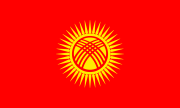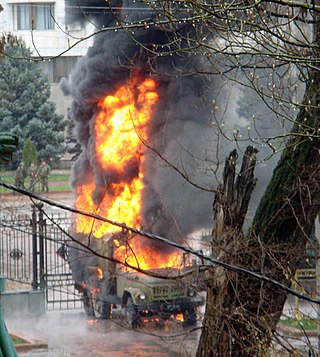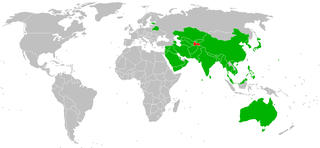
Kyrgyzstan competed at the 2011 World Aquatics Championships in Shanghai, China between July 16 and 31, 2011.

Kyrgyzstan competed at the 2011 World Aquatics Championships in Shanghai, China between July 16 and 31, 2011.
Kyrgyzstan qualified 3 swimmers. [1]
| Athlete | Event | Heats | Semifinals | Final | |||
|---|---|---|---|---|---|---|---|
| Time | Rank | Time | Rank | Time | Rank | ||
| Dmitrii Aleksandrov | Men's 200m Breaststroke | 2:21.51 | 43 | did not advance | |||
| Vasilii Danilov | Men's 200m IM | 2:08.68 | 38 | did not advance | |||
| Athlete | Event | Heats | Semifinals | Final | |||
|---|---|---|---|---|---|---|---|
| Time | Rank | Time | Rank | Time | Rank | ||
| Daria Talanova | Women's 200m Breaststroke | 2:38.07 | 30 | did not advance | |||

Bishkek, formerly known as Frunze, and earlier Pishpek, is the capital and largest city of Kyrgyzstan. Bishkek is also the administrative centre of the Chüy Region. Bishkek is situated near the border with Kazakhstan and has a population of 1,074,075, as of 2021.

The history of the Kyrgyz people and the land now called Kyrgyzstan goes back more than 3,000 years. Although geographically isolated by its mountainous location, it had an important role as part of the historical Silk Road trade route. Turkic nomads, who trace their ancestry to many Turkic states such as the First and Second Turkic Khaganates, have inhabited the country throughout its history. In the 13th century, Kyrgyzstan was conquered by the Mongols; subsequently it regained independence but was invaded by Kalmyks, Manchus, and Uzbeks. In 1876, it became part of the Russian Empire, remaining in the USSR as the Kirghiz Soviet Socialist Republic after the Russian Revolution. Following Mikhael Gorbachev's democratic reforms in the USSR, in 1990 pro-independence candidate Askar Akayev was elected president of the SSR. On 31 August 1991, Kyrgyzstan declared independence from Moscow, and a democratic government was subsequently established.

The economy of Kyrgyzstan is heavily dependent on the agricultural sector. Cotton, tobacco, wool, and meat are the main agricultural products, although only tobacco and cotton are exported in any quantity. According to Healy Consultants, Kyrgyzstan's economy relies heavily on the strength of industrial exports, with plentiful reserves of gold, mercury and uranium. The economy also relies heavily on remittances from foreign workers. Following independence, Kyrgyzstan was progressive in carrying out market reforms, such as an improved regulatory system and land reform. In 1998, Kyrgyzstan was the first Commonwealth of Independent States (CIS) country to be accepted into the World Trade Organization. Much of the government's stock in enterprises has been sold. Kyrgyzstan's economic performance has been hindered by widespread corruption, low foreign investment and general regional instability. Despite those issues, Kyrgyzstan is ranked 70th on the ease of doing business index.

Kyrgyzstan, officially the Kyrgyz Republic, is a landlocked country in Central Asia, lying in the Tian Shan and Pamir mountain ranges. Bishkek is the capital and largest city. Kyrgyzstan is bordered by Kazakhstan to the north, Uzbekistan to the west, Tajikistan to the south, and China to the east and southeast. Ethnic Kyrgyz make up the majority of the country's over 7 million people, followed by significant minorities of Uzbeks and Russians.
The Kyrgyzstan national football team, officially recognised by FIFA and AFC as Kyrgyz Republic, represents Kyrgyzstan in international football and is controlled by the Kyrgyz Football Union, a member of the Asian Football Confederation (AFC) and Central Asian Football Association.

The National Anthem of the Kyrgyz Republic was adopted on 18 December 1992 by a resolution of the Supreme Council of Kyrgyzstan. The music was composed by Nasyr Davlesov and Kalyi Moldobasanov, and the words were written by Jalil Sadykov and Shabdanbek Kuluyev.

Roza Isakovna Otunbayeva is a Kyrgyz diplomat and politician who served as the President of Kyrgyzstan from 7 April 2010 until 1 December 2011, becoming the first female Central Asian head of state. She was sworn in on 3 July 2010, after acting as interim leader following the 2010 April Revolution, which led to the ousting of President Kurmanbek Bakiyev. She previously served as Minister of Foreign Affairs and as head of the parliamentary caucus for the Social Democratic Party of Kyrgyzstan. She is also known for the persecution of human rights activist Azimzhan Askarov and the failed policy that led to the clashes of June 2010.

Human rights in Kyrgyzstan improved after the ouster of President Askar Akayev in the 2005 Tulip Revolution and the installment of a more democratic government under Roza Otunbayeva. While the country is performing well compared to other states in Central Asia, many human rights violations still take place. While LGBT rights have been declining in recent years, freedom of press has been improving.

Manas International Airport is the main international airport in Kyrgyzstan, located 25 kilometres (16 mi) north-northwest of the capital, Bishkek.
Education in Kyrgyzstan is compulsory for nine years, between ages seven and 15. Following four years of primary and five years of lower secondary school, the system offers two years of upper secondary school, specialized secondary school, or vocational/technical school.

The United Kingdom recognised Kyrgyzstan on 20 January 1992 and diplomatic relations were established on 12 June 1992. The first Kyrgyz Ambassador to the UK arrived in September 1997. The Kyrgyz embassy is located in the Ascot House in Marylebone, London.

The 2010 Kyrgyz Revolution, also known as the Second Kyrgyz Revolution, the Melon Revolution, the April Events or officially as the People's April Revolution, began in April 2010 with the ousting of Kyrgyz president Kurmanbek Bakiyev in the capital Bishkek. It was followed by increased ethnic tension involving Kyrgyz people and Uzbeks in the south of the country, which escalated in June 2010. The violence ultimately led to the consolidation of a new parliamentary system in Kyrgyzstan.

The 2010 South Kyrgyzstan ethnic clashes were clashes between ethnic Kyrgyz and Uzbeks in southern Kyrgyzstan, primarily in the cities of Osh and Jalal-Abad, in the aftermath of the ouster of former President Kurmanbek Bakiyev on 7 April. It is part of the larger Kyrgyz Revolution of 2010. Violence that started between Kyrgyz and Uzbeks on 19 May in Jalal-Abad escalated on 10 June in Osh.

The Kyrgyzstan national ice hockey team is the national men's ice hockey team of Kyrgyzstan. They are controlled by the Ice Hockey Federation of the Kyrgyz Republic and has been an associate member of the International Ice Hockey Federation (IIHF). As of 2022, Kyrgyzstan is ranked 49th in the IIHF World Ranking.

This page shows the Tajikistan national football team's results in International Matches, as recognized by FIFA:
Kyrgyzstan Women's League is the top division of women's football in Kyrgyzstan. The league is organized by the Football Federation of Kyrgyz Republic and was established in 2005. Before 1991, some Kyrgyz women's clubs had competed in the Soviet Union women's league system, but after the collapse of the Soviet Union most women's teams left for Russia or simply dissolved.

Azimzhan Askarov was a Kyrgyzstani political activist who founded the group Vozduh in 2002 to investigate police brutality. Of ethnic Uzbek descent, during the 2010 South Kyrgyzstan ethnic clashes, which primarily targeted people of the Uzbek nationality, Askarov worked to document the violence.

Kyrgyzstan competed at the 2012 Summer Olympics in London, United Kingdom from 27 July 2012 to 12 August 2012. This was the nation's fifth appearance at the Olympics in the post-Soviet era.
Karakol International Airport is an international airport serving Karakol, the capital of Issyk-Kul Province (oblast) of Kyrgyzstan. The Russian IATA code for Karakol International Airport is КПЖ.
Miss Kyrgyzstan is a national beauty pageant in Kyrgyzstan. The pageant was founded in 2009, where the winners were sent to Miss Universe, Miss World, Miss International and Miss Earth.